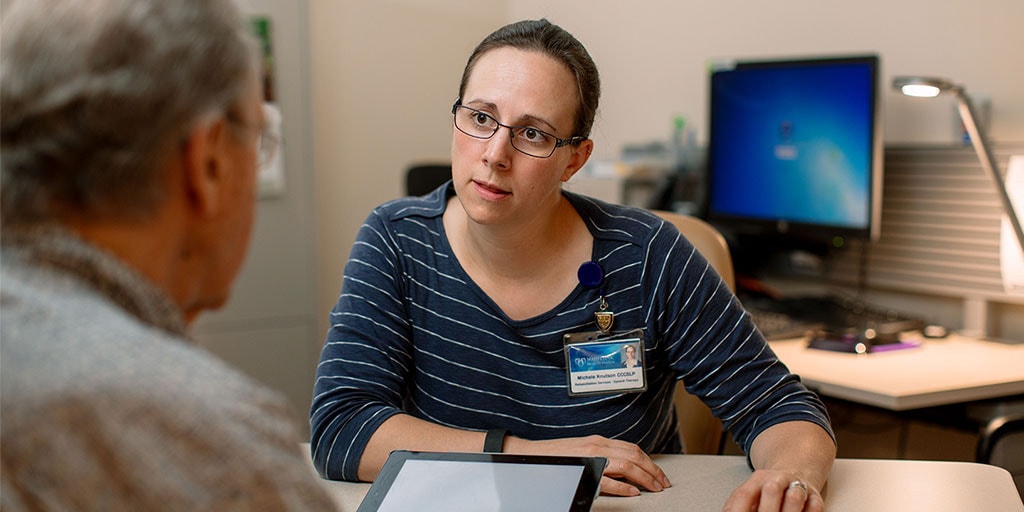How a Speech Pathologist Works with Schools to Improve Student Outcomes
How a Speech Pathologist Works with Schools to Improve Student Outcomes
Blog Article
Just How a Speech Pathologist Can Aid Improve Interaction Abilities
Reliable interaction is a foundation of individual and professional success, yet numerous individuals face challenges that hinder their capacity to share themselves plainly. A speech pathologist is outfitted to resolve these obstacles with targeted evaluation and intervention strategies customized per individual's demands. By using evidence-based healing methods, they not only work to boost speech and language conditions but also improve overall communicative competence. Recognizing the diverse role of a speech pathologist reveals just how their know-how can change lives, inviting a closer exam of the certain methods and end results connected with their practice.
Recognizing Communication Disorders
Recognizing communication disorders is crucial for identifying how they affect people' capability to share themselves and engage with others. Communication problems encompass a vast array of problems that influence speech, language, and social interaction, commonly hindering efficient interaction. These conditions can develop from various factors, including neurological problems, developing delays, physical impairments, or emotional problems.
Speech disorders may materialize as troubles in articulation, voice, or fluency manufacturing, influencing exactly how words are obvious or spoken. Language conditions, on the other hand, involve difficulties in understanding or utilizing language, which can hamper both non-verbal and spoken communication. Social interaction problems are identified by troubles in the pragmatic aspects of communication, such as taking turns in conversation or understanding social cues.
The repercussions of communication disorders are profound, impacting not only the individual's ability to convey thoughts and emotions however likewise their social connections, academic chances, and general high quality of life. Understanding of these conditions can cultivate compassion and support, motivating reliable approaches for interaction and involvement. Comprehending the complexities of communication problems is an essential step towards advertising inclusivity and resolving the demands of those impacted.
Role of a Speech Pathologist
Speech pathologists regularly play an essential function in dealing with and detecting communication disorders, using a variety of evidence-based techniques customized to every individual's demands. These specialists collaborate with individuals throughout the life expectancy, from children with speech delays to adults recouping from strokes or distressing brain injuries. Their experience includes a variety of interaction problems, consisting of expression, voice, fluency, and language disorders.
In healing settings, speech pathologists make use of structured treatments developed to boost communication abilities. They may apply techniques such as speech workouts, language games, and social interaction training to facilitate enhancements in responsive and meaningful language capabilities. Speech Pathologist. In addition, they educate customers and their families regarding reliable communication methods and adaptive approaches to navigate day-to-day communications
Beyond direct treatment, speech pathologists work together with other medical care educators, experts, and caretakers to ensure a thorough technique to therapy. They advocate for clients by providing resources and support, enabling people to attain their interaction objectives and improve their total quality of life. As professionals in the field, speech pathologists are crucial in fostering effective communication, promoting self-reliance, and improving social participation for those with communication difficulties.
Evaluation and Medical Diagnosis Refine
The evaluation and diagnosis process carried out by speech pathologists normally entails a detailed evaluation to identify communication disorders accurately. This procedure starts with a thorough instance background, where the clinician gathers relevant information about the person's clinical, instructional, and developmental background. Recognizing the context of the individual's interaction troubles is crucial for a precise diagnosis.
Following the medical history, speech pathologists use standard examinations and informal assessments to review different aspects of interaction, consisting of speech noise manufacturing, language understanding, expressive language, and social interaction skills. These assessments are customized to the individual's age and details problems, supplying valuable information for analysis.
Monitoring is likewise a vital component of the analysis process, as it permits the clinician to see direct exactly how the specific interacts in all-natural settings. In addition, interviews with relative and educators can supply understanding into the person's communication obstacles across different settings.
Once the analysis is total, the speech pathologist manufactures the findings to figure out a medical diagnosis and suggest ideal treatments. This detailed evaluation procedure makes sure that individuals obtain targeted support customized to their one-of-a-kind interaction needs, laying the structure for efficient therapeutic approaches.
Restorative Techniques and Methods
Countless therapeutic methods and approaches are employed by speech pathologists to deal with a range of communication conditions properly. One widely utilized technique is expression treatment, which concentrates on correcting speech sounds through repeating and aesthetic signs. This strategy is specifically advantageous for individuals with speech audio conditions.
An additional efficient method is language treatment, which boosts both responsive and meaningful language abilities. This might entail interactive tasks that promote their website vocabulary advancement, syntax understanding, and conversational abilities. In addition, speech pathologists usually make use of social abilities educating to boost practical language abilities, allowing individuals to navigate social interactions more successfully.
Fluency shaping and stuttering alteration strategies are especially created to help those experiencing fluency conditions. These techniques assist clients develop smoother speech patterns and manage the physical and psychological elements of stuttering.
In addition, augmentative and alternative interaction (AAC) systems are utilized for individuals with extreme interaction impairments. These systems, which can consist of motions, signs, or digital gadgets, provide essential assistance for efficient communication.
Advantages of Speech Therapy

Furthermore, speech therapy can assist in creating essential listening and understanding skills, fostering far better communication in discussions. Individuals with cognitive-communication problems can likewise profit, as treatment focuses on reinforcing memory and analytical capabilities, vital for effective communication.
Another critical aspect is the psychological support provided throughout therapy sessions. Speech pathologists create a secure atmosphere, encouraging individuals to conquer anxiety and frustration associated to their communication concerns. This support can bring about improved self-worth and overall psychological health.
Furthermore, very early intervention via speech therapy can stop further issues, guaranteeing that people reach their full communicative capacity. Overall, the benefits of speech treatment extend past plain speech improvement, favorably influencing different measurements of life for those influenced by communication problems.
Verdict
In summary, speech pathologists play a vital role in dealing with interaction problems through evaluation, medical diagnosis, and customized therapeutic interventions. By utilizing evidence-based strategies, these specialists enhance individuals' speech and language capacities, cultivating improved clarity, fluency, and social interaction abilities. read The advantages of very early treatment underscore the significance of seeking help from speech pathologists, as their competence can dramatically boost communicative potential, ultimately resulting in higher success in both individual and expert rounds.

Speech pathologists often play an essential role in identifying and dealing with communication conditions, using an array of evidence-based techniques tailored to each individual's requirements. As specialists in the area, speech pathologists are essential in promoting efficient interaction, advertising freedom, and enhancing social involvement for those with interaction obstacles.

Report this page